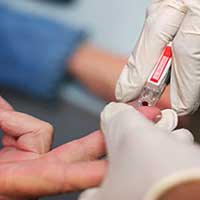A recent study published in Lancet Healthy Longevity discovered that the ability to multitask while walking, such as talking or making decisions, starts to decline at the age of 55, ten years earlier than the traditional old age threshold of 65. Researchers from Harvard Medical School and Hebrew SeniorLife conducted the study, which involved nearly 1,000 adults in Spain aged between 40 and 64
Harvard Medical School
VirScan blood test can reveal viral history
Your complete viral history revealed by VirScan – Blood test detects exposure to hundreds of viruses simultaneously – VirScan – a single blood test can now simultaneously test for more than 1,000 different strains of viruses that currently or have previously infected a person.
Mammography screening for breast cancer needs individualized approach
The mammography dilemma — Complex benefits and harms of mammography require individualized approach – A comprehensive review of 50 year’s worth of international studies assessing the benefits and harms of mammography screening suggests that the benefits of the screening are often overestimated, while harms are underestimated.
Pazopanib better than sunitinib in advanced kidney cancer
Pazopanib shows better quality-of-life in advanced kidney cancer – Two oral targeted drugs — Pazopanib (Votrient) and sunitinib (Sutent) — approved for metastatic kidney cancer worked equally well, but one proved superior in tolerability, the safety profile and many measures of quality of life favored pazopanib.
Two more Autism Centers of Excellence funded
New NIH funding for two Autism Centers of Excellence — A total of 11 centers now funded for up to five years – The National Institutes of Health has awarded $5.3 million in initial one-year funding to the latest two recipients of the Autism Centers of Excellence (ACE) program. With these awards, announced on World Autism Awareness Day, these and nine other ACE centers in US are now being funded for up to five years.
Natural HIV control may rely on T cell
Natural HIV control may rely on sequence of T cell receptor protein — Protein on the surface of killer T cells appears to confer ability to suppress viral replication – The rare ability of some individuals to control HIV infection with their immune system alone appears to depend ? at least partially ? on specific qualities of the immune system’s killer T cells and not on how many of those cells are produced. Even among individuals sharing a protective version of an important immune system molecule ? the ability of HIV-specific killer T cells to control viral replication appears to depend on the particular sequence of the protein that recognizes HIV infected cells.
Specific antipsychotic drugs increase risk in elderly dementia patients
Research: Differential risk of death in older nursing home residents prescribed specific antipsychotic medications: Population-based cohort study – Nursing home residents over the age of 65 who take certain antipsychotic medication for dementia are at an increased risk of death, suggests a research paper published in BMJ. Haloperidol had double the risk of mortality amongst other drugs for the condition, say researchers.
Breast cancer risk increases with high hormone levels
Elevated hormone levels add up to increased breast cancer risk – Breast cancer risk may rise with high hormone levels – Eight different sex and growth hormones may rise the risk of breast cancer, each elevated hormone level increase risk by 16% in post-menopausal women.
Poor sleep quality increases blood pressure
Poor sleep quality increases risk of high blood pressure – People with the lowest level of slow wave sleep (SWS) had an 80 percent increased risk of developing high blood pressure. Sleep disorders and poor quality sleep are more common in older adults than in younger ones.
Low body fat may not lower risk for heart disease and diabetes
Genetic study shows that low body fat may not lower risk for heart disease and diabetes – Researchers revealed that some people with a specific form of the gene are more likely to have lower percent body fat, but also more likely to develop heart disease and type 2 diabetes, because the gene lowers only the “subcutaneous” fat under the skin, but not the more harmful “visceral” fat that surrounds organs. People with this gene variant are less able to store fat safely under the skin and may, therefore, store fat elsewhere in the body, where it may interfere with normal organ function.


